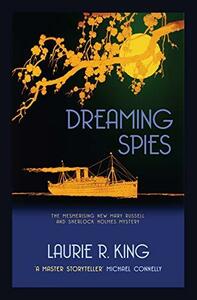You need to sign in or sign up before continuing.
Take a photo of a barcode or cover
It's always a pleasure to go on another adventure with Mary Russell and her husband, Sherlock Holmes.
Without a doubt her best in the series for several books, this tale of intrigue was told at a perfect pace - a slow enough for some character development, but enough mystery and reveals about motivations and identities to keep any fan of the genre happy. The very idea of a Basho book illustrated by Hokusai is divine.
adventurous
challenging
mysterious
tense
medium-paced
adventurous
mysterious
medium-paced
Plot or Character Driven:
A mix
Strong character development:
Yes
Diverse cast of characters:
Yes
Summer comfort reading while I recover from shoulder surgery July 2024
Read this at least once before - 2015? 2016?
Set in Japan, this fills in the gap between book #7 in the series, The Game (set in India), and book #8 in the series, Locked Rooms (set in San Fransisco). Mary Russell and Sherlock Holmes are taking the long way home from India to England. This book goes into detail about Mary's childhood in America.
Read this at least once before - 2015? 2016?
Set in Japan, this fills in the gap between book #7 in the series, The Game (set in India), and book #8 in the series, Locked Rooms (set in San Fransisco). Mary Russell and Sherlock Holmes are taking the long way home from India to England. This book goes into detail about Mary's childhood in America.
While I was glad to see Oxford make such a lovely appearance, I didn't appreciate reader Jenny Sterlin's Japanese "accent." It was distracting, and the amount of time the book as a whole spent indulging in long Orientalist tangents were off-putting in the extreme. Like, we get it. Rice. Lots of rice. MOVE ON.
adventurous
mysterious
medium-paced
Oh Sherlock and ninjas! It was fun to see the leading duo play second fiddle in the end, and the detailed Japanese culture was a highlight.
adventurous
mysterious
slow-paced
As a teenager I read this series almost devotedly, and some of the earlier adventures I really truly love; I even consider the first book one of my all-time favorites. But right before the release of this installment in 2015 I fell off the Russell & Holmes train for awhile and got behind by 5 books. So when started this one in order to catch up, I was SHOCKED at how much I immediately disliked:
-the chemistry between Russell and Holmes is nonexistent in this installment. Their interactions are sanitized and just downright boring, with none of the spark that I vividly remember (and can point to exact passages) from the earlier books.
-the STAGGERING amount and abuse of phonetic spelling used by King to convey accents, particularly Japanese ones. King draws out scenes and emphasizes over and over just how difficult it is for various Japanese characters to pronounce English words, especially the English letter "r", and is just quite offensive at times. Russell is also deeply judgy about characters not being able to speak "properly".
-the reliance on Japanese stereotypes, such as comparing Japanese characters to dolls and children because of how "tiny" they are; the broad, sweeping statements about Japanese people being super industrious; the repetitive scenes of Russell turning her nose up at Japanese foods that are, to her, basically all just stinky dried fish. And there aren't things that just happen a bit and then Russell learns from them and corrects her thinking - even up until the very end of the book these problems persist.
-the mystery is little more than a brainteaser wrapped in a history lesson that King has tried to make multilayered but is really just quite messy. I genuinely didn't believe for a moment this was a case Holmes (any version of him) would get involved in, let alone not be able to see the very obvious answers to.
I don't remember any of the previous books having the same issues to this extent, but I'm also not sure how much of it was maybe a younger me not picking up on things? I'm going to continue my catch-up of the series for now (partially to find out if "Dreaming Spies" is just a weak link) but I'm really disappointed in King for both the overall mystery as well as astounding amount of stereotypes and snobbery she's written into this book.
-the chemistry between Russell and Holmes is nonexistent in this installment. Their interactions are sanitized and just downright boring, with none of the spark that I vividly remember (and can point to exact passages) from the earlier books.
-the STAGGERING amount and abuse of phonetic spelling used by King to convey accents, particularly Japanese ones. King draws out scenes and emphasizes over and over just how difficult it is for various Japanese characters to pronounce English words, especially the English letter "r", and is just quite offensive at times. Russell is also deeply judgy about characters not being able to speak "properly".
-the reliance on Japanese stereotypes, such as comparing Japanese characters to dolls and children because of how "tiny" they are; the broad, sweeping statements about Japanese people being super industrious; the repetitive scenes of Russell turning her nose up at Japanese foods that are, to her, basically all just stinky dried fish. And there aren't things that just happen a bit and then Russell learns from them and corrects her thinking - even up until the very end of the book these problems persist.
-the mystery is little more than a brainteaser wrapped in a history lesson that King has tried to make multilayered but is really just quite messy. I genuinely didn't believe for a moment this was a case Holmes (any version of him) would get involved in, let alone not be able to see the very obvious answers to.
I don't remember any of the previous books having the same issues to this extent, but I'm also not sure how much of it was maybe a younger me not picking up on things? I'm going to continue my catch-up of the series for now (partially to find out if "Dreaming Spies" is just a weak link) but I'm really disappointed in King for both the overall mystery as well as astounding amount of stereotypes and snobbery she's written into this book.
Combining "current" 1925 with missing details of the past shipboard journey and Japan.






